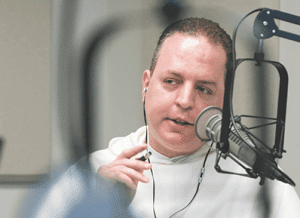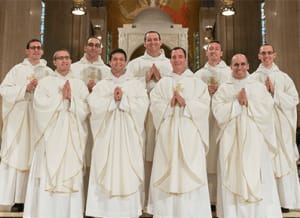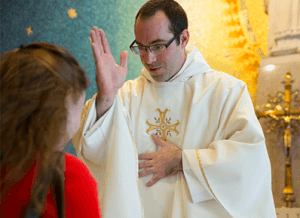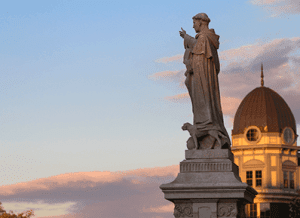Letter from the Director

Dear Friends,
A friend once asked me, “Do you want to go to Mass with me this Sunday?”
“Sure,” I replied.
“Do you want to go to Communion?” “Yeah” I answered, thinking to myself,
‘Didn’t you just ask me that?’
Without any guile, he inquired, “When
was the last time you went to Confession?” Struggling to remember, I guessed,
“About twelve years ago.”
“You need to go to Confession.
Trust me, it will be worth it.” Those three questions followed by a piece of advice changed my life.
There is a great need today for an army of preachers to teach about the necessity of being in the state of grace before receiving the Eucharist. When people begin to understand why they should not present themselves for Communion, they paradoxically enter into a deeper union with God. A contrite mea culpa (my fault) opens us up to the mystery of the felix culpa (O happy fault) of sin and redemption!
The Garden of Eden narrative tells the story of how our wounded human nature leads us to blame others for our problems. Adam claimed he was a victim of the woman God placed by his side. Adam’s heart was in danger of caving in on itself. His self justification started a path towards self enslavement. Tradition holds that our first parents moved out of this downward spiral by owning up to their faults and cooperating with God’s grace. Ancient icons depict Christ breaking down the gates of Hades to lead Adam and Eve to paradise.
Why do we begin every Mass with a mea culpa? Jesus answers this question with the parable of the Pharisee and the Publican who go to worship God. The former considers himself devout because he keeps the Sabbath, but he does not have the humility of the Publican, who recognizes his own sin and begs God for mercy.
God wants to create a new heart in us. Jesus, the new Adam, gives us His heart in the Eucharist. If we are prepared for this tremendous gift, it transforms us. If not, we are like the man in the parable “praying to himself” to no avail.
St. Paul warns us that if we receive the Eucharist in an unworthy way, we eat and drink condemnation upon ourselves (1 Corinthians 11:27-32). This is why Catholic holders of public office should not present themselves for Communion if they contradict Church teaching on grave moral issues like abortion.
With your help, we are training a growing band of brothers to remedy errors that prevent our country and our Church from becoming all God has called us to be.
Yours in Christ,

Fr. Gabriel Gillen, O.P.
Executive Director
Dominican Friars Foundation
The Dominican Foundation of Dominican Friars Province of St. Joseph, Inc. is a NY State tax-exempt corporation under section 501(c) (3) of the Internal Revenue Code, with
Tax ID # 26-3273636.






